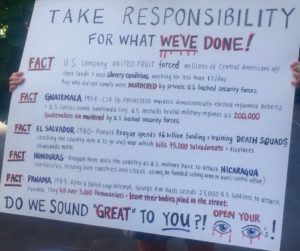“Don’t come to our country illegally,” President Trump blasted in a recent tweet, his solution to the current immigrant crisis – one in which thousands of immigrants are fleeing violence in Central America and attempting to cross into the United States. He went on to emphasize the importance of borders, national sovereignty, and “rule of law.”
“Don’t invade our country,” Central Americans might well have twittered back. What goes ‘round, comes arou nd, and whether you believe in laws of kharma and the spiritual interconnectedness of life on this planet or not, there is plenty of evidence that the “crises” we see today were initiated long ago by actions that our country took. And the actions we take today will have profound effects on the future.
nd, and whether you believe in laws of kharma and the spiritual interconnectedness of life on this planet or not, there is plenty of evidence that the “crises” we see today were initiated long ago by actions that our country took. And the actions we take today will have profound effects on the future.
In most of the reports I have read about the “immigrant crisis,” there is some recognition that there are reasons families take the tremendous risks they do to cross the border into the United States – a migration that costs thousands of dollars and potentially their lives, with no guarantee of success. These reports usually mention the rampant gang violence in Central America, and sometimes domestic violence as well.
But there is scant mention of the role of the United States played in begetting that violence, through “interventions” we took over the last century. Interventions, by their very name, involve a disrespecting of nat ional sovereignty, borders, and the rule of law. They are achieved militarily – i.e. through violence.
ional sovereignty, borders, and the rule of law. They are achieved militarily – i.e. through violence.
Take the case of Guatemala. In 1954, the CIA engineered a coup that overthrew the democratically-elected presidency of Jacobo Arbenz, because Arbenz had instituted land reform that threatened the U.S.-based United Fruit Company, which was owned by Allen Dulles, brother to CIA director John Foster Dulles. (For details on this history see Steve Kinzer’s book, The Brothers: John Foster Dulles, Allen Dulles, and their Secret World War.) This ushered in fifty years of military dictatorships that were supported and funded by the United States, leading to the “disappearance” or murder of some 200,000 civilians and a legacy of violence that now reverberates in everyday life.
My point is simple: violence begets violence; for every action there is a reaction; and what we do today will have profound effects on tomorrow.
The United States’ recent decision to separate young children from their families at the border, regardless of their requests for asylum (asylum from violence that we are implicated in), will have repercussions far into the future: trauma layered on historical trauma. Recognizing our own role in creating these conditions would offer us an opportunity to right the historical record, to repair, restore, and set in place a different legacy.
Let me end on a more uplifting note. Last week’s international efforts to rescue the soccer team from the cave in Thailand shows the good that can happen when people come together to support life, not thwart it. While some psychologists have warned that the boys may be traumatized by their experience, all reports thus far are that the boys are happy and at peace. This is likely due to the great efforts their coach took to care for them during their time in the cave, and to ensure that they cared for each other. And now, the mothers of the boys are promising to help “heal the heart” of the young coach who is suffering from his feelings of responsibility – such a different response than the press seemed to expect from the parents.
A situation that could have been tragic, traumatic, and full of blame or shame, has become an opportunity to see the power of interconnectedness, the good that can happen when we work together, and the healing power of care. As a favorite podcast reminds me (https://www.oneyoufeed.net/), we can choose how we respond to any situation in the world, and how we choose matters for what we set in play. There seem to be many forces that perpetuate violence and negativity, but with just a little conscious effort, we might tip the balance toward positivity and love.